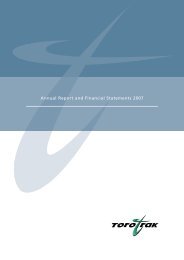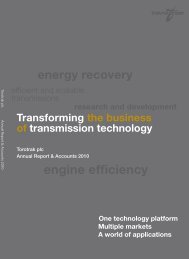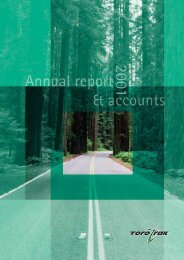Annual report 2004 - Torotrak
Annual report 2004 - Torotrak
Annual report 2004 - Torotrak
- No tags were found...
You also want an ePaper? Increase the reach of your titles
YUMPU automatically turns print PDFs into web optimized ePapers that Google loves.
directors' <strong>report</strong>The directors present their <strong>report</strong> on the results and affairs of the group for the year ended 31 March <strong>2004</strong>.Business activityThe <strong>Torotrak</strong> group is the world leader in the design and development of traction drive infinitely variable transmission (IVT) systems. Ourtechnology offers the automotive industry significant improvements in fuel economy, performance and smoothness combined withinnovative driving control features. <strong>Torotrak</strong>'s principal commercial strategy is to generate royalty income from volume manufacture of itsIVT by car companies and transmission suppliers.Operating and financial reviewsThe business is reviewed in the chairman’s statement on page 2, chief executive’s review on pages 4 to 9 and the finance director’s reviewon page 10. Information on likely future developments in the business is included in these reviews.DividendThe directors do not recommend the payment of a dividend.DirectorsThe directors who held office during the year are set out below:David WallisRichard ElsyRebecca JoyceDavid PriceJames BatchelorJohn GrantMalcolm Coster (resigned 31 October 2003)Ian Macpherson (resigned 31 December 2003)David Burnicle (resigned 31 October 2003)Nicolas Barter (appointed 1 November 2003)David MacKay (appointed 1 November 2003)Biographical details of the directors in office at the year end are shown on pages 12 and 13.Directors' remuneration, service contracts and shareholdingsInformation on directors’ remuneration, contracts and beneficial interests in the shares of the company are included in the remuneration<strong>report</strong> on pages 21 to 24.Election of directorsNicolas (Nick) Barter, non-executive director, and David MacKay, non-executive director, who were appointed to the board during the yearoffer themselves for election at the annual general meeting. Rebecca Joyce, finance director, and John Grant, non-executive director, retireby rotation and offer themselves for re-election. Their biographies are shown on pages 12 and 13.Corporate governanceThe board is committed to the highest standards of corporate governance. All of the directors are equally responsible to shareholders forthe management of the group and the protection of its assets. As such, the board is ultimately responsible for ensuring that the groupmaintains adequate systems of internal control and reviewing its effectiveness. The internal control systems are designed to meet thegroup’s particular needs and the risks to which it is exposed. The systems are designed to manage rather than eliminate risk and can onlyprovide reasonable but not absolute assurance against material mis-statement or loss.Combined CodeThe company complies, and complied throughout the year ended 31 March <strong>2004</strong>, with the relevant provisions of the Combined Code,including the recommendations of ‘Internal Control: Guidance for Directors on the Combined Code’ (the Turnbull guidance).The boardThe board currently consists of the non-executive chairman, four executive directors and three other independent non-executive directors.Brief biographies of each of the directors appear on pages 12 and 13.Following the departure of the previous chief executive, David Wallis combined the role of non-executive chairman with that of actingchief executive for four months from September 2002 to January 2003 when he stepped back to his role as non-executive chairman. Thismeant that the company did not comply with the code in this respect in the previous year. The board is satisfied that this short-periodan an executive director has not affected Mr Wallis's independence and accordingly considers him to be independent.John Grant and Nick Barter both have many years of experience at senior levels at Ford, one of our licensees. The board considers thatthe knowledge and expertise of general automotive practice and car manufacturer practice in particular continues to be of greatimportance to the group at this stage. Mr Grant has not been employed by Ford for over 10 years. Dr Barter left Ford in 2002, and priorto becoming a non-executive director of <strong>Torotrak</strong>, had no dealings with the group. Accordingly the board considers them both to beindependent. Mr Grant is the board's senior independent non-executive director.The board structure creates a balance of power such that no individual or small group of individuals can dominate the board’s decisions.The company does not combine the role of chairman and chief executive. The chairman is responsible for the running of the board, andthe non-executive directors have particular responsibility to ensure that the strategies proposed by the executive directors are fullydiscussed and critically examined. The chief executive’s responsibilities focus on managing the group and implementing board strategyand policy.The company secretary is responsible for ensuring that board procedures are followed and all directors have access to her advice. Theboard met 12 times during the year and is supplied in a timely manner with information to enable it to discharge its duties. The boardhas a schedule of matters reserved for its approval including, for example, major capital expenditure and patent abandonment.The directors are entitled to take independent professional advice and receive appropriate training in the course of their duties, at thecompany’s expense. During the course of the year a number of directors received training on the role and duties of a director of a publiccompany, corporate governance and the Combined Code.Board committeesThe board has delegated specific responsibilities to four committees. Each committee is chaired by a non-executive director and operateswithin defined terms of reference set by the board.Audit committee - Reviews and recommends approval by the board of the annual and interim results and the related Stock Exchangeannouncements and ensures that appropriate accounting and financial policies and controls are adhered to.It also reviews the scope and planning of external audits, the half year and full year <strong>report</strong>s from the external auditors, their independenceand objectivity including the nature and extent of the non-audit services provided by their affiliated firms and considers recommendationsconcerning the appointment and remuneration of the external audit firm.The committee meets three times a year and the external auditors and the finance director attend all meetings to ensure that all of theinformation required by the audit committee is available to enable it to operate effectively. The external auditors have the opportunityto meet with the committee without the executive directors being present as required.Remuneration committee - Reviews salaries, performance-related remuneration, pension arrangements and share incentive arrangementsfor the executive directors and directors of subsidiaries and makes recommendations to the board. The remuneration <strong>report</strong>, on pages 21to 24, includes details of remuneration policy and procedures and on the remuneration of directors.14 <strong>Torotrak</strong> annual <strong>report</strong> & accounts <strong>2004</strong> <strong>Torotrak</strong> annual <strong>report</strong> & accounts <strong>2004</strong> 15





